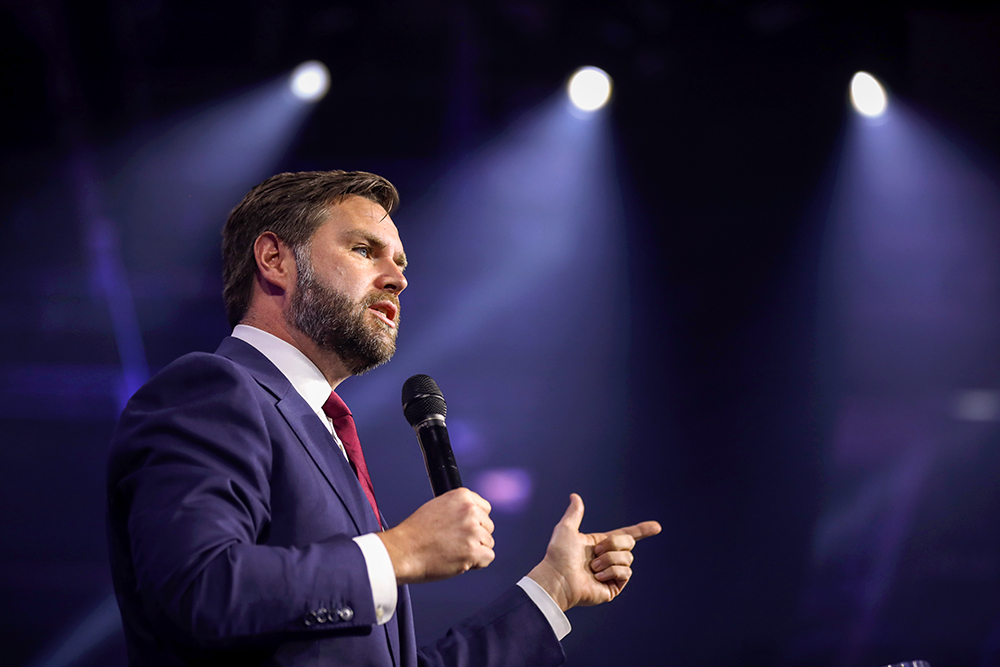
Ohio Sen. JD Vance speaks at the People's Convention in Detroit June 16. (Wikimedia Commons/Gage Skidmore)
Earlier this month, several Catholic academics and media types flooded my inbox with links to an op-ed in The New York Times by Matthew Schmitz that discussed the influence of a group of conservative converts to Catholicism, most prominently the Republican vice presidential nominee, Ohio Sen. JD Vance. They were upset that this convert was telling others about how Catholic ideas were shaping politics.
What was all the fuss?
Schmitz was not wrong to call attention to a phenomenon that has been at work for some time, but especially since the emergence of the Moral Majority in the 1980s as a significant player in conservative politics. As I discussed in my book God's Right Hand: How Jerry Falwell Made God a Republican and Baptized the American Right, Falwell was surprised to learn that some 30% of the early membership of the Moral Majority were Roman Catholics.
Paul Weyrich, the Catholic co-founder of the Heritage Foundation and a Republican operative who had approached Falwell about getting into politics, said after the 1980 Senate election results: "My proudest moment was when an article appeared that said right there — jumped off the page — that Catholics in areas like Dubuque, Iowa, had helped elect the evangelical [Charles] Grassley, and evangelicals in places like Mobile [Alabama] helped elect the Catholic [Sen. Jeremiah] Denton."
As the religious right took shape, Catholics were not only part of the popular base of the movement, but there was also a simultaneous and similar movement among conservative intellectuals.
Evangelicals largely did not have the kind of sustained moral and intellectual reflection on society from a specifically religious perspective that Catholics brought to the table. Some Calvinists had been influenced by Abraham Kuyper, a fascinating theologian and politician whose views on certain social issues overlapped with Catholic ideas, but he would have been unknown in the small Bible schools at which most evangelical preachers learned their theology in the 20th century.
Schmitz doesn't acknowledge the irony that a group of conservative intellectuals join a 'catholic' or 'universal' denomination, but then find themselves promoting some variety of nationalism, Christian or otherwise.
In the 1980s, the Catholic commitment to social democracy found little breathing room in the counsels of Ronald Reagan's White House, or Margaret Thatcher's 10 Downing Street, where a commitment to laissez-faire economics was sacrosanct. After the economic meltdown of 2008, when even Alan Greenspan had to admit his confidence in the markets was misplaced, conservative intellectuals saw the need to question neoliberalism. Good.
Back to Schmitz's essay in the Times. It is not a bad thing that conservatives are abandoning laissez-faire ideas about economics. It is not a bad thing that they are raising questions about the common good.
Still, these post-liberals fail to grasp the humanistic sensibilities of Catholic theology and are far too quick to set aside the achievements of a liberal political order. There are countries that lack America's commitment to a democracy, freedom of religion, a free press, freedom of assembly, and the right to petition the government, and they are not countries any of us would want to live in.
It is odd, too, that Schmitz doesn't acknowledge the irony that a group of conservative intellectuals join a "catholic" or "universal" denomination, but then find themselves promoting some variety of nationalism, Christian or otherwise. Yes, Catholic social thought is built on an organic understanding of society, not a Lockean, contractual one, but when we Catholics talk about the "common good," we know that our concern for "the commons" does not stop at any border.
That said, liberals tend to be a bit histrionic about Christian nationalism. According to religion data guru Ryan Burge, only 6% of Catholics have a "very favorable" view of Christian nationalism, and 14% have a "somewhat favorable" view. Forty-one percent have not even heard of it.
Advertisement
And as I have argued, Christians can and should allow their religious beliefs to shape their hopes for, and criticisms of, society. Christian Americans from Dorothy Day to Dr. Martin Luther King Jr. have done so.
Integralism, the most recurrent variety of Catholic nationalism, garners the attention of the literati but does it have any staying power?
My colleague Brian Fraga reported on a conference held at the Franciscan University in Steubenville, Ohio, where some truly outrageous ideas were put forward. The fact that Vance attended that conference, and could soon be the intellectual power in a second Trump administration, is worrisome, but the ideas peddled by the integralists are ideas only an academic could love.
And, as with all discussions on the right, it is not always easy to assess the degree to which they have been distorted by Trumpism. The former president turns all things coarse and hoary.
If Donald Trump gains power, integralism could be part of the ugly mix, but a second Trump term is frightening for many reasons and would occasion other, more proximate dangers to the First Amendment, such as to freedoms of the press and of assembly. And, since the embrace of human rights and democratic norms in Catholic teaching in the postwar era, these conservative converts can find no warrant in Catholic theology for their wholesale assault on liberalism.
It is an interesting question why the Times tends to highlight mostly conservative Catholics in its opinion pages. In the end, liberal Catholics need nothing more than a self-critical commitment to both liberalism and Catholicism to navigate the challenges these converts pose.
I am glad they have swum the Tiber, and offer the hope they will keep swimming. They may end up with a deeper, more humane understanding of the church's social teachings.







